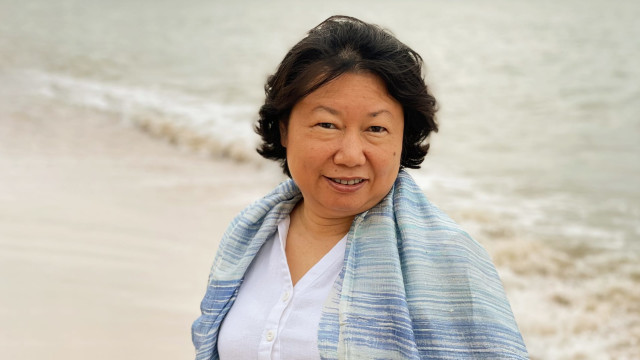Embracing Wholistic Wellbeing through intersectionality

I am a seeker of wellbeing. Not a leader, or a master, or a guru. My pursuit of health and happiness is still young and fresh, and one that you can hop onto yourself. Perhaps you are looking for answers to burning questions; for the comfort of heightened self-awareness; or simply to improve your overall health.
My personal journey of wellbeing started when I suffered from burnout in my early forties. I refused to let my body go at such a young age, eagerly seeking avenues for self-improvement. But the more I dug into the question of wellbeing, the more other questions arose. Rather than finding answers, I encountered more and more curiosities.
Indeed, my wellbeing journey forced me to confront demons and memories which I had either consciously ignored or unconsciously repressed. It took me back to my childhood in India; my daunting travels to America for my master’s degree; my years as a corporate misfit; my sleepless nights building Edifecs…
On the quest for greater self-awareness — and ultimately self-love — I tried piecing all these stories together to get a clear sense of who I truly was. This proved challenging, as I had naturally evolved to see myself as a puzzle of identities. I had a habit of rejecting who I was at every turn in order to fully embrace new opportunities before me. For instance, when launching Edifecs, I rejected my corporate experience to fully invest in my leadership role. I passed over for recognition the vital skills acquired in my previous corporate jobs; not because I wouldn’t be using them, but because I thought that to succeed as an entrepreneur, I would have to do so on my own terms. In doing so, I wrongly compartmentalized my identities, goading myself into separating corporate Sunny from entrepreneur Sunny.
Likewise, when I first came to America, I was quick to discard the customs I had grown up with in favor of new traditions, wary of immersing myself in the culture that had welcomed me. Back then, I was unable to see how the Sikh immigrant and American student lifestyles might be able to coexist.
As I studied these apparent contrasts more closely through the lens of Wholistic Wellbeing, I started to realize these weren’t so much divergent as they were convergent. Though they resembled oppositions, they also could be seen as appositions.
My humble upbringing in Northern India VS a wealthy life in the United States. I previously thought that to authenticate one side of that equation, I had to ignore the other. During my visits back to India, I would try to blend in and hush up part of who I was, while in the States, I would often disavow the traditions that meant so much to me for the sake of ‘feeling’ more American.
My status as an immigrant VS my status as a CEO. Whether it was internalized prejudice or the insanely fast pace of entrepreneurship, I found that the larger my company grew, the harder I worked, and the more I ignored my roots. The financial opportunity that I created for myself through entrepreneurship allowed me to become more worldly: but at what cost? Nowadays still, I sometimes find it difficult to reconcile my traditional Indian background with my newfound world citizenship.
But I have finally got to the point where each ‘VS’ in the false dichotomies spelled out above was erased in favor of an ‘and’. I have learned to embrace these complexities as intersections.
You may have heard of intersectionality: a concept penned by Kimberlé Crenshaw to explain how ethnicity, status, gender, and other individual traits intersect and overlap. She explained that “intersectionality was a prism to bring to light dynamics within discrimination law that weren’t being appreciated by the courts.” It follows the logic that, for instance, a white gay man might experience privilege in certain areas of his life (his sex and the color of his skin), while experiencing hardship or discrimination in others (his sexual orientation).
But intersectionality doesn’t have to focus solely on the meeting point between advantage and oppression: we can empower ourselves to transcend these categories and celebrate intersectionality not just as a balancing act between the different parts of our heritage and identities, but also as a symbol of our uniqueness and the strengths we acquire as we navigate and negotiate our inner complexities.
It’s not our patchwork identities that make us unique: it’s the way we allow them to intersect and inform our own sense of self and, by extension, our own wellbeing. Indeed, intersectionality and Wholistic Wellbeing run along a two-way street: Wholistic Wellbeing helped me embrace intersectionality, and in turn, intersectionality informed my understanding of Wholistic Wellbeing. Intersectionality permeates Wholistic Wellbeing’s very foundations: the seven pillars all intersect and interact with one another.
Celebrating the intersectionality that makes us unique allows us to universalize Wholistic Wellbeing as the one global, unifying, and truly democratic aspiration; it acknowledges our differences and wide-ranging ambitions to ultimately highlight what brings us all together: the pursuit of happiness. Intersectionality allows us to locate the infinite in the finite; to find peace not only within ourselves, but also within the communities and societies in which we live. Embracing intersectionality allows us to embrace Wholistic Wellbeing because it underlines the wholistic cultural unity born from the unison within our own identities.






